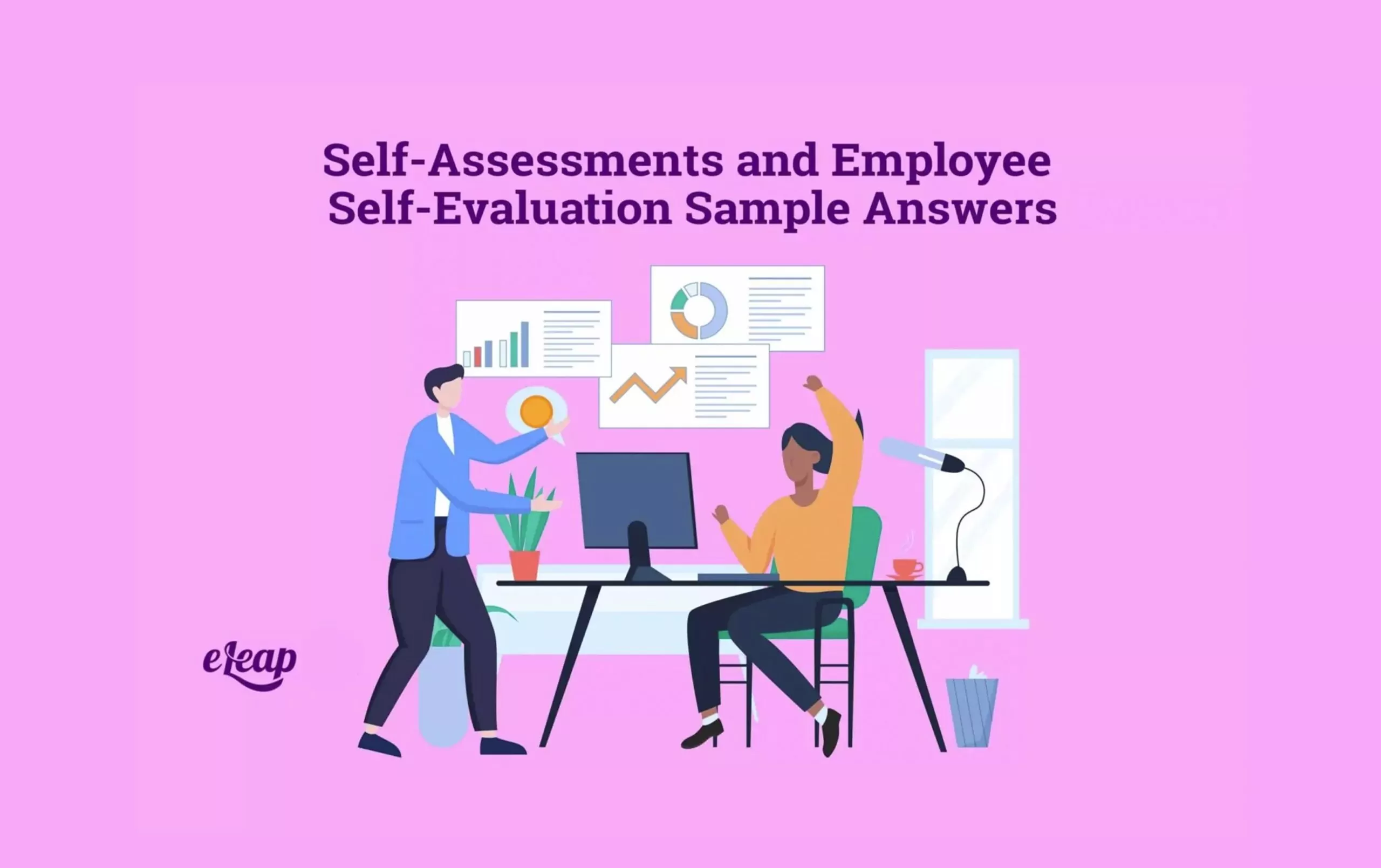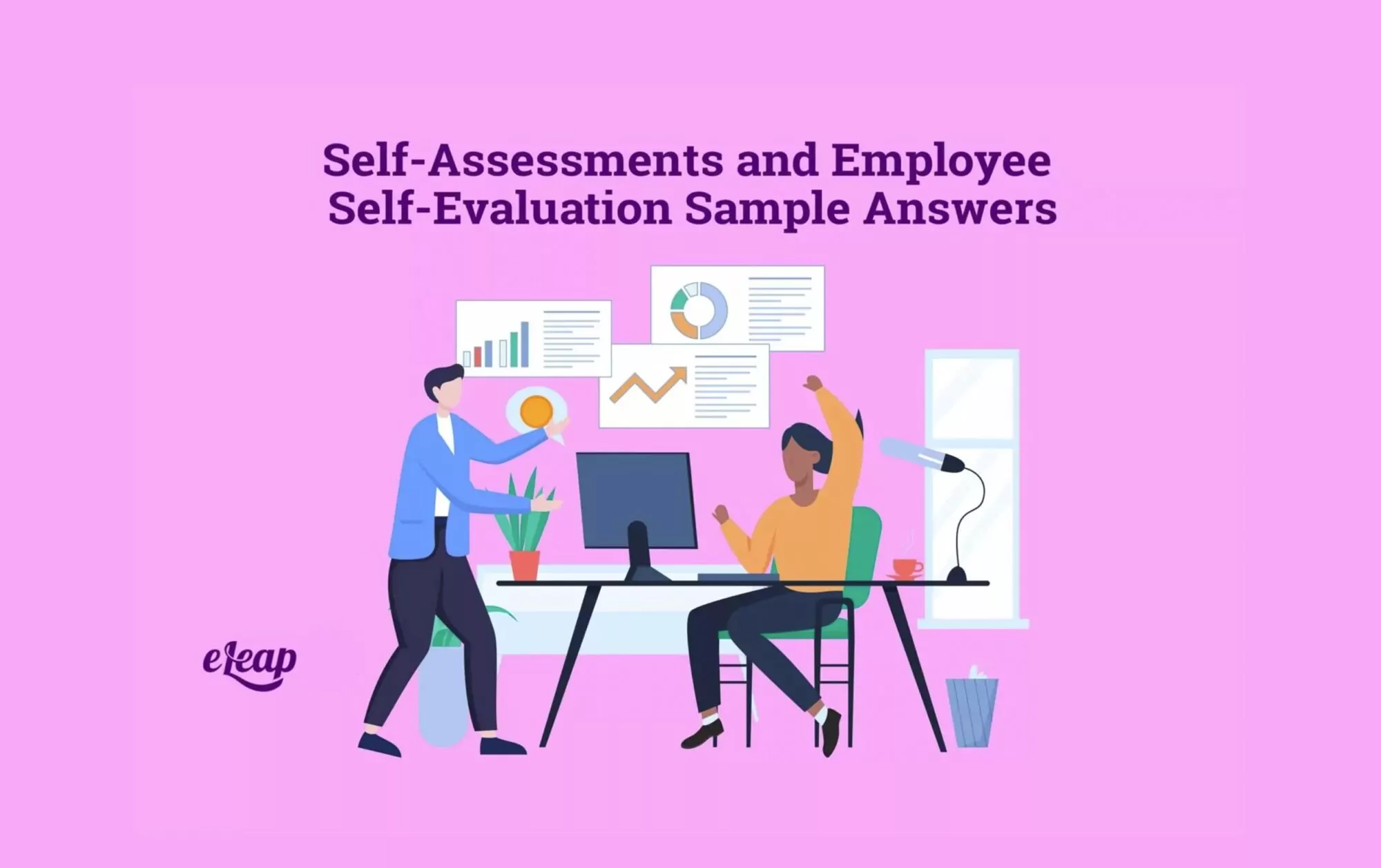Self-Assessments and Employee Self-Evaluation Sample Answers

Coming up with employee self-evaluation sample answers can be a great way to get a better sense of how to respond when doing self-assessments. Most people have gone through manager inspections and evaluations before, but they don’t necessarily evaluate themselves very often. However, knowing how to do this as an employee could be one of the best things for you. Of course, for HR and managers, being able to efficiently collect and process these self-evaluations provides deep insight into how your team members are thriving (or not). Explore how eLeaP’s Performance Management Platform can simplify evaluations, boost productivity, and drive measurable results.

What Is a Typical Evaluation Like Without an Employee Self-Evaluating?
Team and performance management is important for many types of organizations of all sizes. Proper management of the team and everyone’s performance helps managers to evaluate their employees and manage them properly. The team leaders or managers will be the ones who handle the performance reviews in these cases. This is how reviews are often done, and this can be either good or bad.
It’s good to have an evaluation by a supervisor, as it gives employees a better sense of where they stand and whether there are issues to fix. In cases where there are problems with the employees, evaluations can often help them to see the areas where they need to improve, and the managers can provide guidance for those employees.
Although evaluations by managers are common, you don’t see nearly as many employee self-evaluations. One of the problems a lot of employees will face is that by the time they have a performance review from a manager, it’s too late to make any changes or to impress the manager. This is because the manager is reviewing a previous performance. As an employee, it can leave you with a lot of worries since you feel as though you can’t do anything now that will affect the outcome or their opinion.
Be Proactive with Employee Self-Evaluation Sample Answers
Instead of waiting and reacting to what the managers say during a review, you can take charge now. Make changes to how you are performing currently, and always anticipate the sorts of things supervisors are going to be looking for during a review. Of course, you might not be certain exactly where you stand and what you bring to the table if you haven’t had an evaluation.
Therefore, learning to evaluate yourself, and to have some ready-to-go answers for the sorts of things you’ll likely be asked during an evaluation will be quite beneficial. Think about the sorts of things that you might want to showcase and highlight regarding who you are and what you bring to the table for your business.
What About Employee Self-Evaluation in a Formal Evaluation?
It’s also important to keep in mind that sometimes manager evaluations will have a self-assessment portion you will have to fill out. You don’t want to skimp on these sections of a formal evaluation. These sections aren’t there just to take up space and time. They can provide you with a means to write about and demonstrate the type of value you bring to the company.
Self-Evaluations Can Vary
It is important to keep in mind that the types of self-evaluations can and will vary from one business to another. In some cases, they are templated scorecards. Other times, they might be using a fill-in-the-blank option. They might be formal or informal. Sometimes, they might be done orally rather than written. It will depend, and it’s a good idea to have some idea of how to convey what you want to get across using different methods.
Importance of Self-Evaluations
Why do you need to care about self-evaluations? They are important for quite a few reasons. For starters, they let you talk about and showcase your accomplishments, so the manager knows about them and sees them upfront. Keep in mind that your managers might not always remember all of the good things you’ve done since the previous evaluation. You need to remind them. Keep a written record of the accomplishments you can use later.
One of the other primary benefits of using self-evaluations is to help you find areas where you may need to grow and improve. This is helpful for you, as it will show you what you may need to do to bring your skills or service up to a higher level. Having the chance to take action and to make those changes before you are told by a supervisor is always a good idea. It shows that you are taking charge and that you care about your position.
The self-evaluations will also give you time to reflect and think about some of the other opportunities for improvement that are available and how to incorporate them. When you see opportunities to grow and improve, take them. Find more and more ways that you can expand your knowledge and skills.
One of the other nice things about these self-evaluations is that they can help you get better prepared for talking with your manager or supervisor regarding your performance review. You will already know the areas where you need to work on improving. Focusing on those now and heading off those concerns in the review help managers see that you are working on finding your own ways to improve.
You can also use self-evaluations that are part of your performance review to impress your manager. When your manager asks you to write a self-eval for part of your review, it’s your chance to remind them of just how much you do for the team. Even though your manager knows you, their memory is just as flawed as everyone else’s is. Use the space on the self-evaluation to talk about anything of relevance you may have done in the time that has elapsed since the last evaluation.
Tips for Writing a Helpful Self-Evaluation
Whether you are doing a self-evaluation just to see where you stand, or it is for a performance review, there are a few things you’ll want to keep in mind. Most people don’t like writing about themselves. It makes them feel uncomfortable, especially when they have to brag about themselves and their accomplishments.
First, it’s a good idea to keep track of the things that you’ve done, as mentioned, so you can remind your manager. A lot of times, you don’t remember the “great things” you did 10 months ago at work, but you remember the “okay thing” you did last month. Because of recency bias, the “okay thing” is what sticks in your mind and your manager’s mind. You want them to know everything you accomplished. Therefore, you should keep track throughout the year. A notebook or a Word doc is all you need to keep track of this information. Keep a running document and refer to it whenever someone asks you what you did.
Talk about weaknesses as opportunities. We all know that there are certain areas where we excel and others where we wish we did. Essentially, we all have some weak spots. Rather than trying to hide those weaknesses and shove them under the rug, though, you might want to try to reframe them. Talk about them being opportunities where you would like to explore and learn more to improve as an employee. This takes away their power as “weaknesses” and makes the employees appear as though they want to learn more and do more.
Why Should You Have Answers Ready for Employee Self-Evaluation
A lot of people end up waiting until they have their self-evaluation in hand before they start thinking about how they are going to answer. Instead, it’s a good idea to start thinking about these sorts of things early. You will then have time to ruminate on them and edit them until they are perfect.
Get Together Sample Answers for Self-Evaluations
The self-evaluations can cover a lot of ground, so you’ll want to have some good ideas on what you can use as answers. Everyone will have different answers, but it’s a good idea to start writing them down sooner rather than later.
Some of the areas that you will want to have answers for in self-evaluations include communication and cooperation, achievements, teamwork and collaboration, creativity and innovation, problem-solving, critical thinking, and flexibility and adaptability.
Take some time to think about positive answers surrounding each of those areas, as well as potential areas where you might want to improve. Thinking of answers to these and updating them throughout the year will ensure you always have something ready for a self-evaluation.
However, you will find that thinking about these areas and seeing how you stack up in these different categories can help you in an unexpected way. You will find that you can start to see areas where you might need to make some improvements. Essentially, you can view yourself and your performance the way a manager might. Knowing any problem areas now, and working to make those changes and improvements, will be beneficial for any employee. It can help you shore up areas before a manager sees there is a problem. Putting in the effort to do a self-evaluation now is well worth it for most people.
The eLeaP continuous performance management system provides organizations with powerful options to attract and retain high caliber team members.